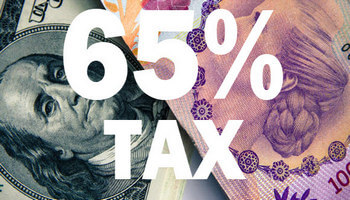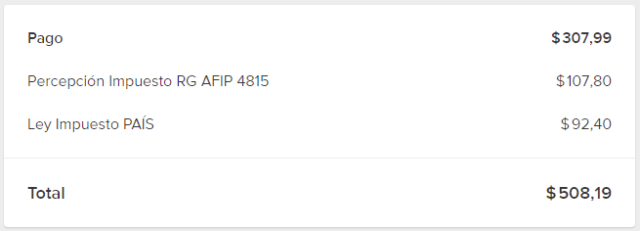How would you feel if every online purchase (except domestic purchases) you made was subject to taxes amounting to 65%? Additionally, it being non-refundable on your tax return? Well, that’s the reality in Argentina today, a country that lurches from one financial crisis to another almost on a monthly basis. In fact, in the really bad times of hyperinflation (1200%) and mega-devaluation, those financial crises were lived through on a daily basis. However, today the writing is on the wall for Argentina, with an IMF debt of over US $70 billion, inflation oscillating between 40- 50%, and a poverty rate at roughly the same proportion. It’s only a matter of time.
The 65% tax is in fact two taxes targeted at purchases in foreign currency because the country is so strapped for hard currency, the only option appears to be to tax the population until the pips squeak. However, every tale has two sides to it and the only purchases I ever make in foreign currency are with Steam when buying games. I’m loathe to give even one cent to this corrupt and mendacious regime, but very often the prices on Steam are so ridiculously cheap if your account is Argentina-based, it’s hard not to take advantage. For example, the other day I bought This Land Is My Land for about $3.00, where the base price for most other markets is around $28, so even taking into account the hideous 65% tax, it’s still a bargain. Steam prices are quoted in local currency by the way, and about twelve months ago the platform cancelled all local payment options, so each purchase is still subject to currency conversion, hence the onerous tax.
Rather preposterously, one of the taxes is described as a tax for supportive and inclusive Argentina, a description that makes me cringe with its populist and hypocritical ideals. It’s also worth mentioning that I wouldn’t even consider a direct purchase through Amazon, eBay, or any other company outside Argentina unless I was literally at the point of desperation. I mean, paying 65% on top of a $200 purchase for say, a hard drive or similar, is tantamount to getting a good shafting several times over. And that wouldn’t even include customs fees, other taxes, and the obligatory bribes one is forced to pay just to import anything into this country.
It is indeed strange that a country so rich in resources seems hell-bent on committing hari-kari at every turn and subjecting its people to isolationist policies that can only be compared to dictatorships such as Venezuela and North Korea. But again, there are flip sides. With a spread of around 75% between the official peso/dollar exchange rate and with enough US dollars stashed away under your bed, you can probably buy a new car for nearly half the official price, if you know how to dance the dance.
Or as they say in Spanish, no hay mal que por bien no venga. In other words, every cloud has a silver lining.
—



You could do what you do anywhere so I have to ask, why do you live there?
I was just about to say the same. Marc – why not try to move somewhere ? I know that’s a big call but it can’t be looking good for personal safety if the economy is crumbling.
An excellent question, the answer to which is a little more complicated than would be appropriate to go into here.
It is and has been on our radar for a number of years and will always be an option.
Thanks for your comments.